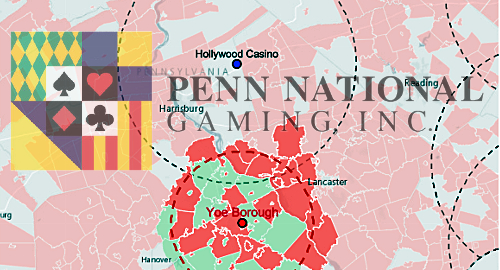 Pennsylvania’s first satellite casino auction winner is the same company suing to overturn the law authorizing those mini-casinos.
Pennsylvania’s first satellite casino auction winner is the same company suing to overturn the law authorizing those mini-casinos.
On Wednesday, the Pennsylvania Gaming Control Board announced that Mountainview Thoroughbred Racing Association, a subsidiary of regional casino operator Penn National Gaming (PNG), had won the auction for the first of 10 possible Category 4 casino licenses.
PNG paid $50.1m for the license, an eyebrow-raising premium over the minimum starting bid of $7.5m. The fact that PNG participated in the auction in the first place is equally surprising, given that it opposed the satellite casino plans from the start and filed a lawsuit this week seeking to overturn the gambling expansion law the state passed last year.
PNG’s opposition to the mini-casinos is that the law prohibits them from being built within a 25-mile radius of any of the state’s existing 12 brick-and-mortar casinos. PNG’s view is that these overlapping buffer zones shield the other operators from Cat 4 competition, while PNG’s Hollywood Casino at Penn National Race Course is isolated and exposed.
PNG’s winning bid allows it to select the site of its Cat 4 venue – provided it’s not in one of the roughly 40% of municipalities that opted out of the running – and the company chose an area of York County about an hour’s drive from Hollywood.
PNG senior VP for public affairs Eric Schippers told Philly.com that the company had “one eye on defense, one eye on offense” while making its decision. The chosen site effectively blocks other operators from horning in on Hollywood’s turf, so PNG apparently decided that if anyone was going to cannibalize Hollywood’s revenue, it might as well be PNG.
PNG has until Friday to submit its $50.1m payment, after which it will have six months to file its license application indicating the precise location of its new venue. The slots-only license costs $7.5m, but PNG has the option of paying an additional $2.5m for the right to add up to 30 gaming tables (plus the option of adding a further 10 tables after one year of operation).
PNG’s lawsuit accuses the state of violating its constitutional protections to equal protection under the law and due process. The company says it plans to withdraw its bid should its lawsuit prove successful. The state’s next mini-casino auction is scheduled for January 24.





